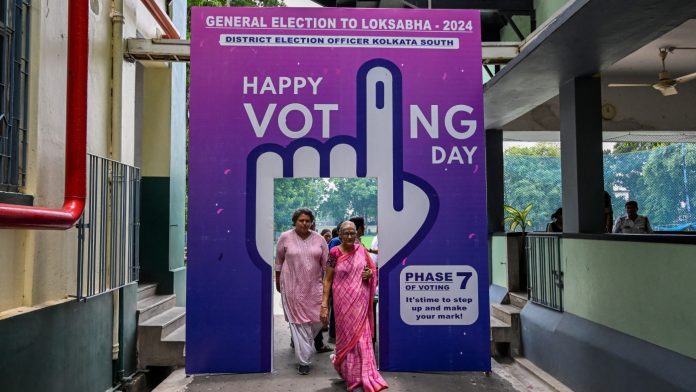Voters leave after casting their ballot at a polling station in the final phase of voting in India’s general election, in Kolkata on June 1, 2024. Artificial intelligence tools were used to create memes and images about political rivals in India and elsewhere around the world.
Dibyangshu Sarkar/AFP via Getty Images
hide caption
toggle caption
Dibyangshu Sarkar/AFP via Getty Images
In January, thousands of New Hampshire voters picked up their phones to hear what sounded like President Biden telling Democrats not to vote in the state’s primary, just days away.
“We know the value of voting Democratic when our votes count. It’s important you save your vote for the November election,” the voice on the line said.

But it wasn’t Biden. It was a deepfake created with artificial intelligence — and the manifestation of fears that 2024’s global wave of elections would be manipulated with fake pictures, audio and video, due to rapid advances in generative AI technology.
“The nightmare situation was the day before, the day of election, the day after election, some bombshell image, some bombshell video or audio would just set the world on fire,” said Hany Farid, a professor at the University of California at Berkeley who studies manipulated media.
The Biden deepfake turned out to be commissioned by a Democratic political consultant who said he did it to raise alarms about AI. He was fined $6 million by the FCC and indicted on criminal charges in New Hampshire.
But as 2024 rolled on, the feared wave of deceptive, targeted deepfakes didn’t really materialize.
“It wasn’t quite the year of AI elections like many folks foretold,” said Zeve Sanderson, who studies how digital information is changing society at NYU’s Center for Social Media and Politics.
Instead, the most visible use of AI in many countries was to create memes and content whose artificial origins weren’t disguised. Often, they were openly shared by politicians and their supporters.

Farid said going into this year, he was more concerned about this sort of “death by a thousand cuts” than the AI bombshell scenario.
“I don’t think the images were designed to be clearly deceptive, but they were designed to push a narrative, and propaganda works,” he said. “I do think that there was a general polluting of the information ecosystem where people just started to give up.”
Resurrecting a dead dictator
Take Indonesia, where the political party Golkar used AI to reanimate Suharto, the longtime dictator who died in 2008.
“I am Suharto, the second president of Indonesia,” the AI Suharto says before endorsing the party’s candidates, in a video posted to the social media site X by Golkar’s deputy chairman. The fake Suharto says Golkar’s candidates will “continue my dream of Indonesia’s progress.”
Soon after, Suharto’s son-in-law — who also had Golkar’s support — was elected president.
AI memes were also prevalent in India, where the world’s largest democratic exercise took place last spring.
In May, at a bazaar in Jaipur, a trader named Dilip, who only has one name, told NPR his friends forwarded him AI-generated memes on WhatsApp, the popular messaging platform owned by Meta.
He said he liked the ones mocking opposition leader Rahul Gandhi, like one where an AI version of Gandhi was depicted as a stupid thief, imagining all the money he would steal if he won.
Still, Dilip said despite the memes, he’d already made up his mind about who to vote for.
One generative AI artist in India, who goes professionally by the name Sahid SK, said he took on memes because there was less risk of being sued for defamation by angry candidates. He said memes are a wink, not outright misrepresentation.
“I think that’s the only reason we haven’t seen many deepfakes in this election. Because everybody’s afraid of legal notices,” Sahid SK said.
Plenty of false and misleading narratives were spread in India and other countries without using AI at all — instead, through edited and doctored videos known as “cheapfakes.”
Musk and Trump embrace AI-generated memes
In the U.S., political memes and viral videos spanned the spectrum from Photoshopped images and out-of-context clips to AI-generated portraits of Vice President Kamala Harris in Soviet garb and of Black Americans supporting former President Donald Trump.




